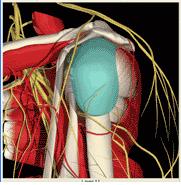The shoulders are an area that can give golfers a great deal of trouble. Shoulder injuries are prevalent in golfers, and there are some simple reasons why this happens. There are several muscles in the shoulder complex that are tied to the posture of the upper body. When imbalances develop in the chest, upper back and shoulder, upper cross syndrome, rotator cuff disorders, tightness in the chest, limited shoulder motion, and shoulder complex asymmetries to name just a few, are likely to occur.
There are many shoulder disorders that can exist for years and not let us know they are there. There are some that we know about right away. You may have a slight rotator cuff tear, or cartilage tear, or a bone spur in your shoulder, but that doesn’t mean that your shoulder will hurt or get in the way of golf. You could have arthritis, but it may not hurt. If we add the motion of the golf swing to poor torso mobility or scapular stability and or a degenerative processes or slight injury or deformity, the shoulder will give out and you will experience pain with your golf motion.

The golf swing requires large amounts of rotation in the shoulder joint. If rotation is limited or lacking, the shoulder will be stressed during the swing.
There are two key principles that we will take up in the biomechanics section of this course. They are the issues of required mobility in the thoracic spine and shoulder blade stability. When thoracic rotation is lacking, there will be excessive mobility in the shoulder blade. This can lead to instability and injury in the shoulder joint. In the coming weeks we are going to dissect the problem of shoulder injuries and pain. We will examine anatomical issues, biomechanical issues, and swing faults.
Here is an interesting fact for you to consider…if you struggle with deceleration in your swing, you probably have a shoulder problem on your downswing side, whether it hurts or not. This is important information to know as you think about your next steps in seeing improvements in your body and in your golf.
If you try these exercises and you find them to be too challenging or uncomfortable, do not continue, until you have consulted with your physician. All exercises for golf should be customized to your needs after a proper evaluation.
Come In and See Us
Want to take your golf to the next level? Our FitGolf® Trainers are experts at working one-on-one with you to tailor a training program to meet the specific needs of your body and help you achieve the results you are hoping to see in your golf.
Want More Resources?
Looking for more exercise resources, blog posts or monthly golf-specific exercise content sent straight to your inbox?
